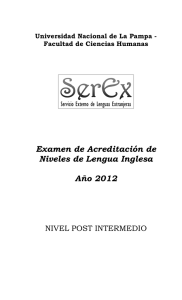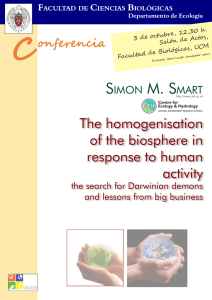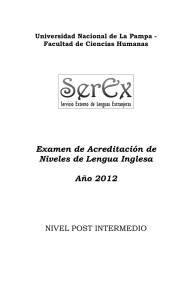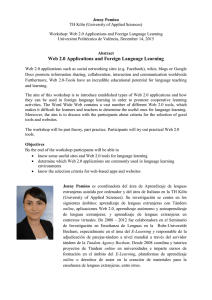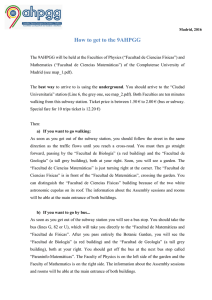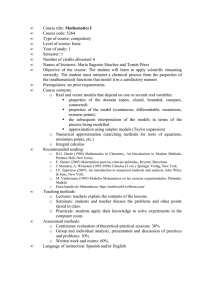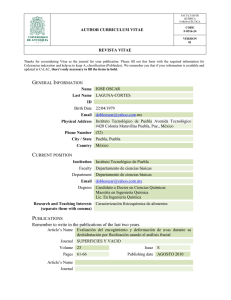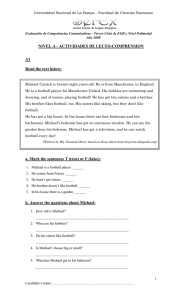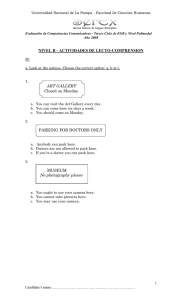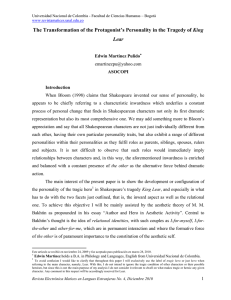TEST DE DIAGNÓSTICO 2012 Bike Nightmare
Anuncio
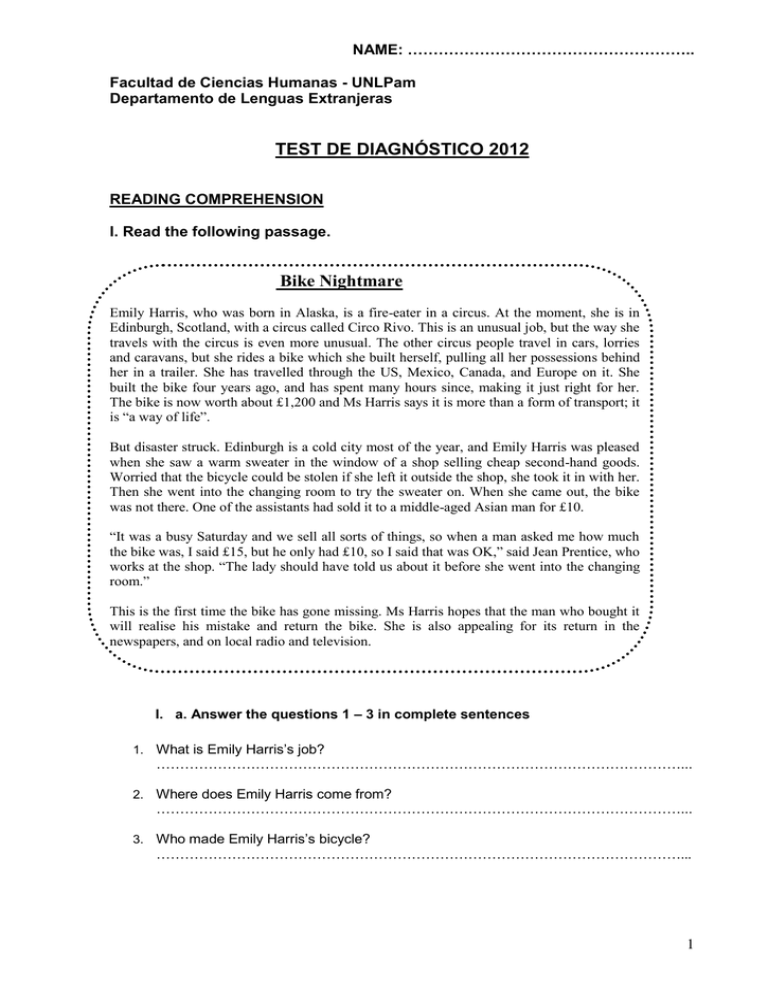
NAME: ……………………………………………….. Facultad de Ciencias Humanas - UNLPam Departamento de Lenguas Extranjeras TEST DE DIAGNÓSTICO 2012 READING COMPREHENSION I. Read the following passage. Bike Nightmare Emily Harris, who was born in Alaska, is a fire-eater in a circus. At the moment, she is in Edinburgh, Scotland, with a circus called Circo Rivo. This is an unusual job, but the way she travels with the circus is even more unusual. The other circus people travel in cars, lorries and caravans, but she rides a bike which she built herself, pulling all her possessions behind her in a trailer. She has travelled through the US, Mexico, Canada, and Europe on it. She built the bike four years ago, and has spent many hours since, making it just right for her. The bike is now worth about £1,200 and Ms Harris says it is more than a form of transport; it is “a way of life”. But disaster struck. Edinburgh is a cold city most of the year, and Emily Harris was pleased when she saw a warm sweater in the window of a shop selling cheap second-hand goods. Worried that the bicycle could be stolen if she left it outside the shop, she took it in with her. Then she went into the changing room to try the sweater on. When she came out, the bike was not there. One of the assistants had sold it to a middle-aged Asian man for £10. “It was a busy Saturday and we sell all sorts of things, so when a man asked me how much the bike was, I said £15, but he only had £10, so I said that was OK,” said Jean Prentice, who works at the shop. “The lady should have told us about it before she went into the changing room.” This is the first time the bike has gone missing. Ms Harris hopes that the man who bought it will realise his mistake and return the bike. She is also appealing for its return in the newspapers, and on local radio and television. I. a. Answer the questions 1 – 3 in complete sentences 1. What is Emily Harris’s job? …………………………………………………………………………………………………... 2. Where does Emily Harris come from? …………………………………………………………………………………………………... 3. Who made Emily Harris’s bicycle? …………………………………………………………………………………………………... 1 NAME: ……………………………………………….. Facultad de Ciencias Humanas - UNLPam Departamento de Lenguas Extranjeras I. b. Mark questions 4-8 T or F 4. The bicycle was left outside a shop. _____ 5. Emily Harris was in Edinburgh when she lost the bicycle. _____ 6. The shop Emily Harris went to, sells new bikes. _____ 7. The bicycle was sold for £10. _____ 8. Emily Harris is trying to get the bike back by making public appeals. _____ I. c. Write the words in the box. 9. Find a word or phrase in the passage which means the OPPOSITE of : cool 10. Find a word or phrase in the passage which means the SAME as: about 40-60 years old 2 NAME: ……………………………………………….. Facultad de Ciencias Humanas - UNLPam Departamento de Lenguas Extranjeras II. Read the following text. Security and privacy on the Internet There are a lot of benefits from an open system like the Internet, but we are also exposed to hackers who break into computer systems just for fun, as well as to steal information or propagate viruses. So how do you go about making online transactions secure? Security on the Web The question of security is crucial when sending confidential information such as credit card numbers. For example, consider the process of buying a book on the Web. You have to type your credit card number into an order form which passes from computer to computer on its way to the online bookstore. If one of the intermediary computers is infiltrated by hackers, your data can be copied. It is difficult to say how often this happens, but it’s technically possible. To avoid risks, you should set all security alerts to high on your Web browser. Netscape Communicator and Internet Explorer display a lock when the Web page is secure and allow you to disable or delete ‘cookies’. If you use online bank services, make sure your bank uses digital certificates. A popular security standard is SET (secure electronic transactions). E-mail privacy Similarly, as your e-mail message travels across the net, it is copied temporarily on many computers in between. This means it can be read by unscrupulous people who illegally enter computer systems. The only way to protect a message is to put it in a sort of ‘envelope’, that is, to encode it with some form of encryption. A system designed to send e-mail privately is Pretty Good Privacy, a freeware program written by Phil Zimmerman. Network security Private networks connected to the Internet can be attacked by intruders who attempt to take valuable information such as Social Security numbers, bank accounts or research and business reports. To protect crucial data, companies hire security consultants who analyse the risks and provide security solutions. The most common methods of protection are passwords for access control, encryption and decryption systems, and firewalls. Virus protection Viruses can enter a PC through files from disks, the Internet or bulletin board systems. If you want to protect your system, don’t open e-mail attachments from strangers and take care when downloading files from the Web. (Plain text e-mail alone can’t pass a virus.) Remember also to update your anti-virus software as often as possible, since new viruses are being created all the time. 3 NAME: ……………………………………………….. Facultad de Ciencias Humanas - UNLPam Departamento de Lenguas Extranjeras II. a. Answer a- Why is security so important on the Internet? …………………………………………………………………………………………………... b- What security features are offered by Netscape Communicator and Internet Explorer? …………………………………………………………………………………………………... c- What security standard is used by most banks to make online transactions secure? …………………………………………………………………………………………………... d- How can we protect and keep our e-mail private? …………………………………………………………………………………………………... e- What methods are used by companies to make internal networks secure? …………………………………………………………………………………………………... f- Which ways can a virus enter a computer system? …………………………………………………………………………………………………... II. b. Find a word or phrase in the text for the following definitions/ explanations: a- A person who obtains unauthorized access to computer data (Security on the Web) ………………………… b- The process of encoding data so that unauthorized users can’t read it (E-mail privacy) ………………………….. c- Something users have to enter to gain access to a network (Network security) …………...................... d- Techniques used to decode or decipher secret data (Network security) .................................... e- Something you can include as part of your e-mail message (Virus protection) ..................................... f- Something that can infect your files and corrupt your hard disk (Virus protection) ……….......................... 4 NAME: ……………………………………………….. Facultad de Ciencias Humanas - UNLPam Departamento de Lenguas Extranjeras ENGLISH IN USE I. a. Circle the correct answer to go in the gap. 1- My boyfriend .... to the pub every night. GO – GOES – WENT 2- Simon .... very tall. IS – ARE – HAS 3- She .... like football very much. DON’T – DOESN’T – HASN’T 4- How .... does one lesson cost? MANY - MUCH - IS 5- There .... a big supermarket next to my house. IS – ARE - HAVE 6- I .... agree with you. DOESN’T – HAVEN’T – DON’T 7- Neil can't .... tennis. He's broken his arm. TO PLAY – PLAYING – PLAY 8- .... some more tea? WOULD YOU LIKE – DO YOU LIKE – YOU’D LIKE 9- Last week we .... to Warsaw. GO – WENT – GOES 1O- I.... the film we saw at the cinema on Wednesday. DOESN’T LIKE – HAVEN’T LIKED – DIDN’T LIKE 11- Magda .... in England for her holiday last year. WAS – WERE – IS 12- My mother .... never been to a cricket match. HADN’T – HAVEN’T – HAS 13- Joanna .... her new mobile phone. IS LOSING – LOSES – HAS LOST 14- .... ever seen a comet? DID YOU – HAVE YOU – DO YOU 15- If I were rich, I .... buy a huge farm in Somerset. WILL – SHALL – WOULD 16- They .... pass their exam if they studied hard. WOULD – WILL – DID 17- I wish I .... play a musical instrument. CAN – COULD – SHOULD 5 NAME: ……………………………………………….. Facultad de Ciencias Humanas - UNLPam Departamento de Lenguas Extranjeras 18- When Gregory arrived at the disco, Hania ..... . ALREADY LEFT – HAS ALREADY LEFT – HAD ALREADY LEFT 19- If I ..... on holiday to Poland, I wouldn't have met Donata. DIDN’T GO – HAVEN’T GONE – HADN’T GONE 20- By the time you get this letter I .... . WILL HAVE LEFT – AM GOING TO LEAVE – WOULD LEAVE 21- A: What are you doing tonight? B: I'm not sure, I .... to the cinema. WILL GO – WOULD GO – MIGHT GO 22- Simon forgot .... the lights before he left. TURN OFF – TURNING OFF – TO TURN OFF 23- Karla was offered the job .... having poor qualifications. DESPITE – ALTHOUGH – EVEN THOUGH 24- Eric's father ordered him .... out late again. NOT TO STAY – NOT STAY – NOT STAYING 25- If only I .... to the barbecue instead of staying at home. WENT – HAD GONE – DID GO I. b. Read the text below and decide which words belong in the spaces. Queen Elizabeth The first Elizabeth to be queen __1__ England lived in the time of William Shakespeare, __2__ five hundred years ago. Her father was Henry the __3__ , a king who was famous __4__ he had six wives. (Not all __5__ the same time of course!) Elizabeth's mother was Anne Boleyn, a beautiful and intelligent woman. __6__ she could not give the king a son, so Henry took another wife. For many years Elizabeth's life was in danger because __7__ the political and religious problems of the time. However, she __8__ queen, and was queen of England for over forty years. 1. a. at b. for c. of 2. a. almost b. in c. quite 3. a. eight b. eighth c. eighty 4. a. why b. for c. because 5. a. at b. with c. in 6. a. Although b. Despite c. But 7. a. of b. were c. in 8. a. made b. became c. did 6 NAME: ……………………………………………….. Facultad de Ciencias Humanas - UNLPam Departamento de Lenguas Extranjeras I. c. Complete the sentences with the correct form of the word in brackets. Write ONE WORD ONLY on the line. Example: His room was so ......untidy ...... that I couldn’t see the floor. (tidy) 1 I prefer . . . . . . . . . . . . . . . . food to English food. (China) 2 She was very . . . . . . . . . . . . . . . . because she failed her driving test. (happy) 3 I received an . . . . . . . . . . . . . . . . to dinner with the ambassador. (invite) 4 He lost his wallet on the bus, but . . . . . . . . . . . . . . . . , someone found it and handed it in. (lucky) 5 It is . . . . . . . . . . . . . . . . to find a taxi in the rush hour. They’re all occupied. (possible) 6 You must drive very . . . . . . . . . . . . . . . . down the hill. (slow) 7 He is very . . . . . . . . . . . . . . . . about his children’s education. (worry) 8 You mustn’t be . . . . . . . . . . . . . . . . to the new children. You must be friendly. (kind) 9 I think geography is a very . . . . . . . . . . . . . . . . . subject. (interest) 10 The . . . . . . . . . . . . . . . .wore a mask, so nobody saw his face. (rob) I. d. Complete each sentence with two to five words, including the word in bold. 1- She hasn’t finished cooking the meal yet. still She ............................................ the meal. 2- Jack hasn’t travelled abroad for years. time The last ........................................................... abroad was years ago. 3- The jumper is so small that I can’t wear it. too The jumper is ............................................. to wear. 4- Pictures are not allowed to be taken inside the museum. take Visitors ...................................................... pictures inside the museum. 5- Perhaps Dan is in hospital. may Dan ........................................ hospital. 7 NAME: ……………………………………………….. Facultad de Ciencias Humanas - UNLPam Departamento de Lenguas Extranjeras LISTENING COMPREHENSION I. a. Read the statements. Then listen to the holiday story and choose the correct option. 1 They heard good / awful / interesting stories from other tourists about their holidays. 2 The hotel / travel agency / tour company rep. came to see them the next day. 3 They moved to a hotel on / opposite / near the beach. 4 The food was international / local / traditional. 5 The disco was down the street / round the corner / far away. 6 Ellen looked at the tickets at the airport / at the hotel / on the beach. 7 The flight was at one o’clock on Sunday night / morning / lunchtime. 8 People rarely / always / never make that mistake. 9 They had to / didn’t have to / couldn’t pay for the extra day. 10 They’re asking the travel company to give them a free holiday / three extra days / the money back. (Adapted from Inspiration) II. a. Listen to this rescue story and complete the sentences 1 Steve’s job was ___________________________________________ 2 The lost girl was __________________________ years old. 3 The girl was lost in _____________________________________________ 4 Steve needed to get ________________ and ____________________from the girl’s house. 5 The lost girl was wearing ____________________________________ 6 The father didn’t like the photo because _____________________________ 7 Steve felt ________________________ about his mistake. 8 The photo was really _______________________________________ 9 _____________________ explained to the rescue team what had happened with the photo. 10 The girl __________________________________________ (Adapted from Inspiration) 8 NAME: ……………………………………………….. Facultad de Ciencias Humanas - UNLPam Departamento de Lenguas Extranjeras D. WRITING I. a. You have received this note. You decide you want to go to see a film. Reply to Bob’s note using information on the cinema notice board. Tell him you want to go, and arrange a time to meet outside the cinema. (40-50 words) ………………………………………………………………………………………………… ………………………………………………………………………………………………… ………………………………………………………………………………………………… ………………………………………………………………………………………………… ………………………………………………………………………………………………… ………………………………………………………………………………………………… ………………………………………………………………………………………………… ………………………………………………………………………………………………… ………………………………………………………………………………………………… ………………………………………………………………………………………………… ………………………………………………………………………………………………… ………………………………………………………………………………………………… 9 NAME: ……………………………………………….. Facultad de Ciencias Humanas - UNLPam Departamento de Lenguas Extranjeras II. a. Write a composition on ONE of the following topics (150-180 words). USE appropriate STYLE, GRAMMAR and VOCABULARY. a) The most wonderful OR the most frightening experience in your life. b) Advantages and disadvantages of using Facebook. ………………………………………………………………………………………………… ………………………………………………………………………………………………… ………………………………………………………………………………………………… ………………………………………………………………………………………………… ………………………………………………………………………………………………… ………………………………………………………………………………………………… ………………………………………………………………………………………………… ………………………………………………………………………………………………… ………………………………………………………………………………………………… ………………………………………………………………………………………………… ………………………………………………………………………………………………… ………………………………………………………………………………………………… ………………………………………………………………………………………………… ………………………………………………………………………………………………… ………………………………………………………………………………………………… ………………………………………………………………………………………………… ………………………………………………………………………………………………… ………………………………………………………………………………………………… ………………………………………………………………………………………………… ………………………………………………………………………………………………… ………………………………………………………………………………………………… 10
